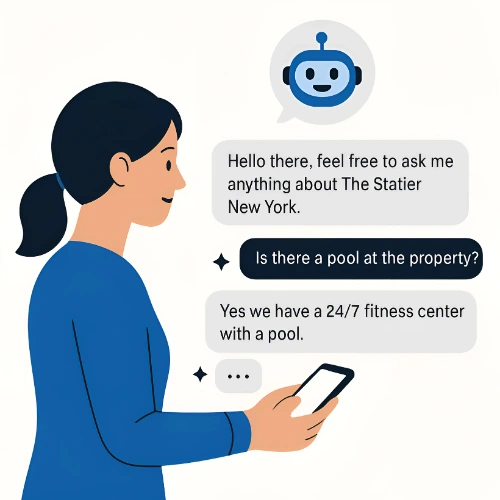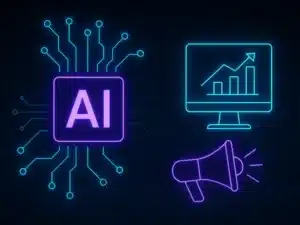Blog Post
Hotel AI Booking Systems Case Studies You Can Learn From
- Update
- Read Time: 8 Min
Share

The hospitality industry consistently seeks ways to deliver exceptional guest experiences and streamline operational efficiency. Artificial Intelligence (AI) booking systems and chatbots have emerged as groundbreaking solutions, enabling hotels to achieve unprecedented levels of efficiency, customer satisfaction, and revenue growth. This article provides an in-depth look at how AI is transforming hotel operations, supported by real-world case studies and practical insights for industry professionals.
The Emergence and Importance of AI in Hospitality
Today’s hospitality industry requires agility to adapt to rapidly changing customer preferences, fluctuating occupancy rates, and the ongoing quest for operational excellence. AI technology equips hotels with tools to address these challenges effectively. Through sophisticated predictive analytics, AI solutions enhance decision-making, enabling hotels to optimize resources, streamline guest interactions, and anticipate market shifts proactively.
In addition to efficiency, AI fosters innovation. Hotels can test and refine new guest offerings by analyzing patterns in real-time. AI also helps smaller boutique hotels level the playing field against larger chains by enabling them to automate processes and personalize guest engagement at scale. As digital transformation accelerates across industries, the hospitality sector must embrace AI to remain competitive and deliver modern experiences expected by today’s tech-savvy travelers.
Understanding Booking Patterns with AI
AI booking systems leverage extensive data analysis to identify booking trends influenced by seasons, local events, and market dynamics. By accurately forecasting occupancy rates, hotels can allocate resources optimally and tailor targeted marketing strategies.

Predictive analytics thus improve profitability by ensuring efficient management of room inventory, pricing adjustments, and strategic marketing initiatives.
Moreover, AI allows hotels to segment their audience more effectively, identifying not only peak times but also booking behaviors across demographics and geographies. This deeper level of insight empowers hotels to design targeted promotions and loyalty campaigns that reflect actual consumer behavior, and it can also support inbound lead generation strategies that attract high-intent travelers actively searching for hospitality services.
Hotels can use this insight to launch early bird promotions during periods that typically attract last-minute bookings, converting uncertainty into confirmed reservations.
Streamlining Check-In Processes
Manual check-in procedures traditionally cause delays, affecting guest satisfaction negatively. AI-driven solutions, including automated kiosks and AI chatbots, simplify and expedite the check-in process. Guests enjoy faster, smoother arrivals, enhancing their overall experience. Meanwhile, hotel staff are freed from repetitive administrative tasks, enabling them to dedicate more time to personalized customer service.
AI also reduces friction by enabling mobile check-in and keyless room entry. These features not only improve convenience but also align with post-pandemic expectations for contactless service. For staff, integrated AI tools offer dashboards that flag potential service issues in real time, allowing for proactive problem resolution. Hotels using AI-enabled check-in systems often see higher guest satisfaction scores and lower operational costs due to reduced front desk congestion.
Enhancing Customer Service Through AI
Exceptional customer service remains fundamental to hospitality success. AI significantly elevates customer service by providing instant, accurate responses to guest inquiries, allowing for deeper personalization of guest interactions.

Personalized Guest Experiences
AI systems collect and analyze vast amounts of guest data, offering insights into customer preferences and behaviors. These insights enable hotels to tailor services and recommendations precisely to individual guests. Personalized suggestions for dining options, local attractions, and room upgrades can significantly improve guest satisfaction and encourage repeat stays.
AI-driven personalization can lead to significantly higher guest satisfaction and repeat bookings, especially when hotels use data to anticipate and exceed guest expectations.
Additionally, personalization extends beyond offers and amenities. AI enables hotels to adjust the tone, timing, and channel of communications based on guest behavior, ensuring each message feels relevant and timely. Whether it’s suggesting a spa appointment after a long flight or reminding a frequent traveler of their favorite breakfast item, AI helps hotels demonstrate they understand and value each guest as an individual.
Boosting Response Times
Prompt responses to guest inquiries are critical to maintaining high levels of satisfaction. AI-powered chatbots instantly address common questions, ensuring guests receive immediate support. This rapid responsiveness allows human staff to focus on complex guest needs, enhancing overall service quality.
Moreover, 24/7 chatbot availability provides peace of mind to guests regardless of time zones or staff schedules. Whether booking a room late at night or requesting extra towels after hours, AI ensures consistent service delivery. Over time, these small but impactful interactions contribute to a seamless, high-quality guest experience that builds loyalty and increases positive reviews.
Leveraging Real-Time Data for Strategic Decisions
The capability to analyze real-time data is transformative for hotel management. AI systems offer real-time insights that inform swift, effective decision-making crucial to operational success.
Revenue Management Optimization
AI-driven dynamic pricing models adjust room rates continuously based on real-time market conditions and competitor pricing strategies. Dynamic pricing is one of the most powerful tools AI enables in hospitality revenue management. This allows hotels to remain competitive and maximize revenue, responding promptly to market fluctuations and customer demand.
Operational Efficiency
Real-time analytics provided by AI help hotels optimize staffing levels, inventory control, and preventive maintenance schedules. Proactive management minimizes disruptions, enhances operational continuity, and significantly reduces costs.
Real-World Case Study: Premier Hotel Group
The Premier Hotel Group, a chain of upscale hotels in urban areas, implemented AI booking systems and integrated chatbot services with remarkable outcomes:

Improved Occupancy Rates and Revenue
Premier Hotel Group leveraged AI analytics to anticipate booking patterns effectively, achieving a 12% increase in occupancy rates and a 9% rise in revenue within a year. AI-driven insights allowed more precise inventory management and strategic pricing adjustments.
Enhanced Operational Efficiency
Implementation of AI systems significantly reduced check-in times by 60%, providing a notably smoother experience for guests. Staff, freed from routine administrative tasks, could prioritize guest interactions and address complex service issues efficiently.
Elevated Customer Satisfaction
AI-driven personalized services improved guest satisfaction scores by 18%. Guests received tailored recommendations that genuinely reflected their preferences, enhancing their overall experience and promoting customer loyalty.
Industry Insights and Best Practices for AI Integration
Successful AI implementation requires careful planning and execution. Key insights from industry experts include:
- Data Integration: Collecting comprehensive data from multiple sources, including booking platforms and guest interactions, is essential for effective predictive modeling.
- Staff Training: Educating staff about AI’s supportive role helps gain acceptance and enhances overall operational effectiveness.
- Ongoing Optimization: Continuous evaluation and adjustment of AI systems maintain effectiveness, ensuring they remain aligned with changing operational needs and guest expectations.
Practical Benefits of AI Chatbots for Hotels
Our AI chatbot solutions for hotels are specifically designed for hospitality applications and deliver immediate operational benefits:
- Automated Routine Interactions: Handling standard guest inquiries effectively allows staff to focus on more demanding tasks.
- Real-Time Guest Assistance: Immediate support during check-in/check-out enhances guest satisfaction significantly.
- Personalized Service: AI-driven guest data analysis enables highly customized recommendations and services.
These chatbots do more than just answer basic questions—they play an active role in reshaping the guest journey. From pre-arrival planning to post-stay engagement, AI chatbots offer a seamless, always-on channel for communication. They can confirm bookings, process special requests, handle complaints, and even translate languages in real time, which is especially valuable for international guests.
AI also brings precision to upselling and cross-selling efforts. Based on real-time behavior, chatbots can recommend room upgrades, in-house services like spa or dining options, or promotional packages, increasing average revenue per guest. Because these suggestions are personalized and timely, they tend to convert better than generic marketing messages.
Hotels adopting AI chatbots also benefit from streamlined data collection. Every interaction provides valuable insight into guest behavior and preferences, which can be used to refine marketing strategies, improve services, and anticipate future needs.
Premier Hotel Group’s successful use of AI illustrates the transformative potential of AI systems in the hospitality sector, proving how strategic AI integration can result in significant improvements in efficiency, guest satisfaction, and profitability.
Why AI is Critical for Future Success
The hotel industry is rapidly evolving, and embracing AI technology is crucial for sustained success. AI enables hotels to optimize their operations and marketing strategies with real-time data, smart automation, and predictive insights that boost both efficiency and profitability.
Furthermore, as guest expectations continue to rise, the adoption of AI technologies becomes imperative for maintaining relevance. AI-powered insights help hotels understand market dynamics, guest behaviors, and emerging trends more clearly, enabling proactive adjustments in service offerings and marketing strategies. By accurately predicting future scenarios, hotels can strategically invest in improvements and innovations that align closely with guest expectations.
AI also empowers hotels to better manage resources by forecasting needs with greater precision, reducing waste and maximizing return on investment.
Ultimately, integrating AI booking systems and chatbots positions hotels not only to meet but exceed guest expectations, securing a strong competitive advantage in an increasingly demanding hospitality landscape.

Conclusion
AI-powered booking systems and chatbot technologies substantially enhance operational efficiency, improve guest experiences, and drive financial performance. Real-world examples, such as Premier Hotel Group, highlight the significant benefits and potential of AI integration. Hotels investing in AI today set themselves on a clear path toward operational excellence, heightened guest satisfaction, and long-term success in the competitive hospitality industry.
Moreover, AI is no longer a futuristic luxury—it’s becoming a standard expectation in the hospitality space. Guests increasingly demand personalized, seamless, and tech-enabled services that mirror the convenience they enjoy in other industries. Hotels that fail to modernize risk falling behind both in guest satisfaction and in operational competitiveness.
AI allows properties to stand out by anticipating guest needs, enhancing every interaction, and maintaining agility in a volatile market. For hoteliers aiming to drive innovation, improve service, and future-proof their operations, AI isn’t just an option—it’s a necessity. Embracing this technology today ensures that your property remains relevant, profitable, and well-regarded for years to come.
Written by
Reisinger Strategies Group Team
Reisinger Strategies Group helps businesses grow with AI-powered marketing solutions, from strategy to execution and built to drive real results.



